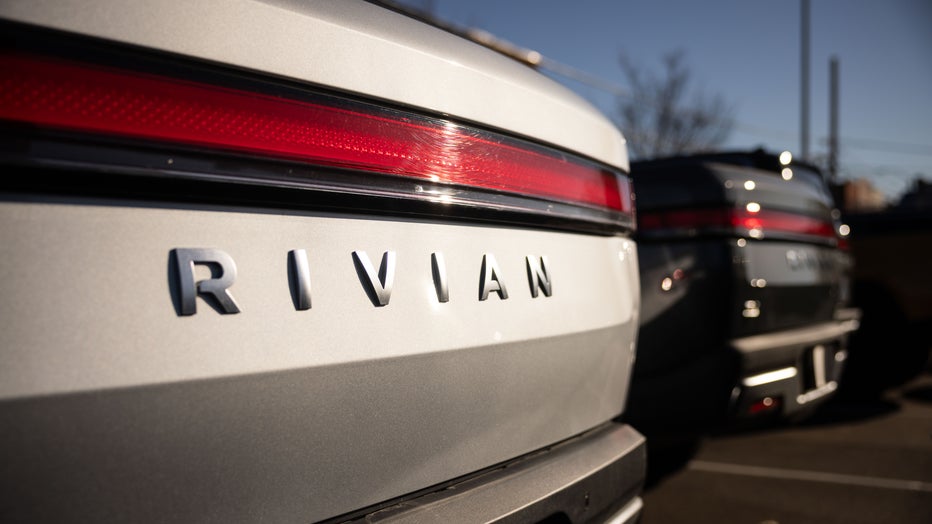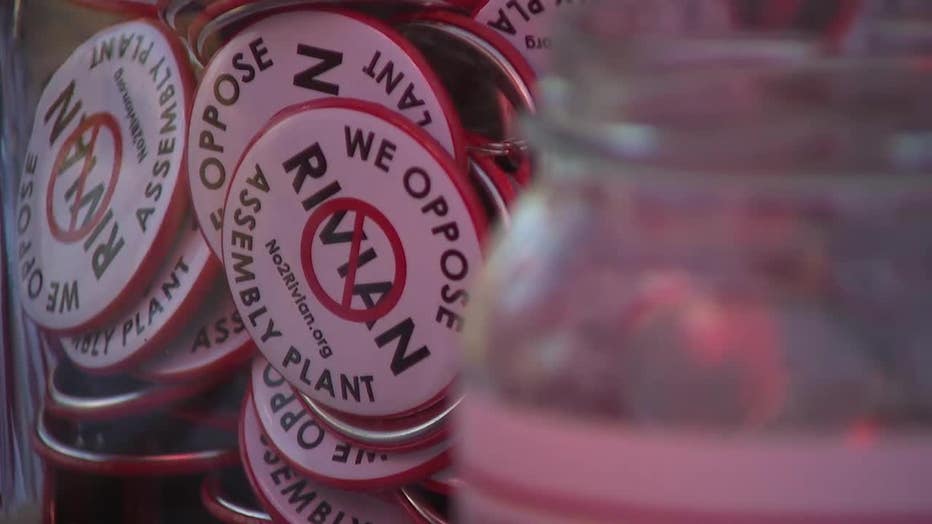Judge dismisses zoning challenges to $5B Rivian EV plant in Georgia
A Rivian showroom in New York, US, on Tuesday, Jan. 2, 2024. Rivian Automotive Inc. missed expectations for quarterly electric vehicle deliveries, weighing on the manufacturers shares even as production ramped up during the past year. Photographer: Y
SOCIAL CIRCLE, Ga. - A judge has dismissed legal challenges to the zoning of a 16 million-square-foot factory on an 1,800-acre megasite chosen by Chicago-based electric vehicle startup Rivian to build its new R2 vehicles. The lawsuit was filed by six nearby residents to the site.
Morgan County Superior Court Judge Stephen Bradley, in a 7-page ruling handed down on Tuesday, wrote that the site is under the jurisdiction of the Joint Development Authority of Jasper, Morgan, Newton, and Walton counties. This means that local regulations and zoning do not apply to the project. The judge also noted that the state, which has heavily invested in the project, is exempt from local zoning ordinances. The site is also not directly owned by Rivian, but rather leased to the tech company for 50 years.
The plaintiffs argued the project continues to cause disruption to their properties and that the megasite is zoned "Agricultural Residential," meaning it could not be used for the "heavy industrial use" according to the county’s ordinances. However, the judge wrote that "economic development" is a legitimate use for the land and does not meet any current exemptions.
The defense also argued this lawsuit was a "nearly identical complaint" filed in Fulton County Superior Court and therefore invalid under the Public Lawsuits Act.
"While the Court may be sympathetic to the local landowners adversely affected by the Rivian Project, it is compelled to follow existing law," the judge wrote. "The General Assembly and the Supreme Court have clearly declared that this type of economic endeavor is valuable and, by not waiving sovereign immunity, outside the reach of local land use regulations.
A joint statement from the Georgia Department of Economic Development and the Joint Development Authority of Jasper, Morgan, Newton, and Walton counties reads:
"Judge Bradley’s latest ruling reaffirmed what the State and JDA have long maintained: State-owned property is not subject to local zoning regulations. The State, JDA, and more importantly, taxpaying Georgians have again prevailed in overcoming the latest attempt by a few individuals who are committed to opposing this generational project that will benefit countless Georgians. It is a new year, and this ruling is a defining new chapter as we look towards a bright future of success with Rivian."
Rivian sees slight downturn in Q4 2023
On Tuesday, Rivian witnessed a decline in its stock value as it disclosed increased vehicle production paired with a dip in deliveries during the fourth quarter of 2023. The company revealed that it produced a greater number of vehicles in the final quarter of the year; however, the actual deliveries fell short compared to the previous reporting period.
Rivian reported delivering 13,972 vehicles between October and December, reflecting a 10.2% decline from the third quarter of 2023. Despite the drop, the figures remained in accordance with the projections set by Wall Street analysts, thereby mitigating some concerns among investors.

A Rivian R1T electric vehicle (EV) pickup truck at a Rivian service center in the Queens borough of New York, US, on Tuesday, Jan. 2, 2024. Rivian Automotive Inc. missed expectations for quarterly electric vehicle deliveries, weighing on the manufact
Investors have closely monitored Rivian's delivery performance as the EV sector faces heightened competition and supply chain challenges. The 10.2% decline in deliveries, while noteworthy, did not deviate significantly from market expectations, which helped stabilize the impact on Rivian's stock value.
Rivian's stock price experienced a dip in the wake of the announcement, reflecting the mixed results. The company's strategic positioning in the EV market, coupled with its production capabilities, remains a focal point for market analysts and investors alike.
Looking forward, Rivian is set to unveil its fourth-quarter earnings results after the close of markets on February 21. The upcoming financial report will provide a comprehensive overview of the company's performance during the crucial year-end period, shedding further light on its growth trajectory and market standing.
Investors and industry observers will be closely watching Rivian's financial disclosures, anticipating insights into the company's ability to navigate industry challenges, capitalize on increasing demand for electric vehicles, and sustain its position in a dynamic and competitive market landscape.
What is the Rivian Project?
Rivian is building a $5-billion, 16-million-square-foot facility on the property which has been leased for the next 50 years.
The factory will be built just north of Interstate 20 and bordered by Highway 278, Darel Drive, and Old Mill Road.
It’s supposed to produce R2 vehicles with lower price tags aimed at a mass market. The company is supposed to eventually hire 7,500 employees at the site near Social Circle, where grading of dirt is supposed to be completed by year’s end.
The first phase of Rivian’s factory is supposed to make 200,000 vehicles a year, starting production in 2024, with a second phase capable of making another 200,000 a year to be completed by 2030. The design of the R2 will be unveiled next year, Rivian officials said.
The plant has been beset by fierce local opposition from residents who say development on the 2,000-acre site will spoil their rural quality of life. The site, between Social Circle and Rutledge, is about 45 miles east of downtown Atlanta.
The state took over planning and zoning for the project after opponents overwhelmed Morgan County officials. Residents have voiced concerns about possible well-water pollution, light pollution and the disruption of wildlife and farmland. Wilson said a site plan and other documents released Monday show Rivian responding to those concerns, shifting the plant away from wetlands and agreeing to limit light pollution.
Rivian currently plans two models for consumers: the R1T pickup with a base price of $67,500 and the R1S SUV, with a base price of $70,000.
Rivian receives record-breaking incentives from Georgia for EV plant
The state of Georgia and local governments will give Rivian Automotive $1.5 billion of incentives to build a 7,500-job, $5 billion electric vehicle plant east of Atlanta, according to documents the company and state signed Monday.
Georgia Economic Development Commissioner Pat Wilson said the size of the package reflects the size of the largest single industrial announcement in Georgia history, including a pledge that the company will reach the full investment and job targets by the end of 2028, with jobs paying an average of $56,000 a year, plus benefits. The state also hopes Rivian will anchor an entire electric vehicle industry.
It is, by far, the largest incentive package Georgia has ever offered to a company. It’s also the largest incentive package any American state has ever given to an auto plant, said Greg LeRoy, executive director of Good Jobs First, a group skeptical of subsidies to private companies.

The state would spend $200 million to buy the site, grade it, build road improvements including a new Interstate 20 interchange and extend utilities. Georgia would spend $62.5 million to build a dedicated training center and a projected $27 million on providing job training.
Other major benefits include a $200 million income tax credit, at $5,250 per job over five years. If Rivian didn’t owe that much state corporate income tax, Georgia would give personal income taxes collected from workers instead. Georgia also estimates sales tax exemptions will save Rivian $175 million on machinery and $105 million on construction materials.
What is the Joint Development Authority of Jasper, Morgan, Newton, and Walton counties?
Originating between Newton and Walton counties, the Joint Development Authority (JDA) of Jasper, Morgan, Newton & Walton Counties has evolved into a pivotal force for economic development in the region. The collaborative effort, officially established in 1999 through unanimous adoption by each county, marked the realization of a shared vision for fostering industrial growth.
The primary objective of the JDA was to establish an industrial hub capable of attracting diverse industries to the area. Notably, the focus centered on the creation of a cutting-edge research park tailored to accommodate bio-science industries.
In the year 2000, a strategic partnership unfolded as the JDA joined forces with the Technology Park of Atlanta (TPA) to meticulously craft a master plan for the region. This collaboration materialized into Stanton Springs, a dynamic mixed-use development that has since become a thriving economic hub.
Presently, the four-county region stands as a testament to the JDA's success, hosting prominent entities such as Takeda, Georgia's BioScience Training Center, Facebook's Newton Data Center, the Newton County Water and Sewerage Authority's Emmons Treatment Facility, and the forthcoming Baymare's Data Center and Rivian Electric Vehicle Plant
The process of governance is a cohesive one, with the Board of Commissioners collectively appointing two members to serve on the JDA Board. Crucially, one JDA Board member must concurrently hold a position on the Board of Commissioners. These appointed members serve dedicated four-year terms unless circumstances prompt an earlier cessation of their service on the Board of Commissioners. This strategic governance ensures a unified approach to steering the JDA towards continued success in fostering economic vitality across the four-county area.
The Associated Press contributed to this report

